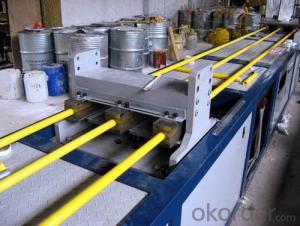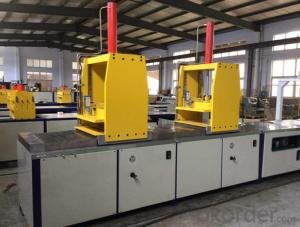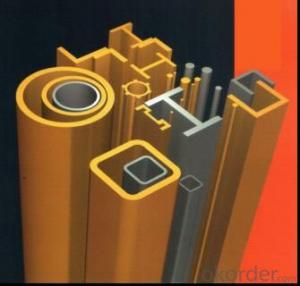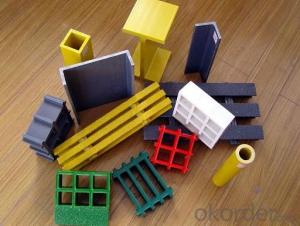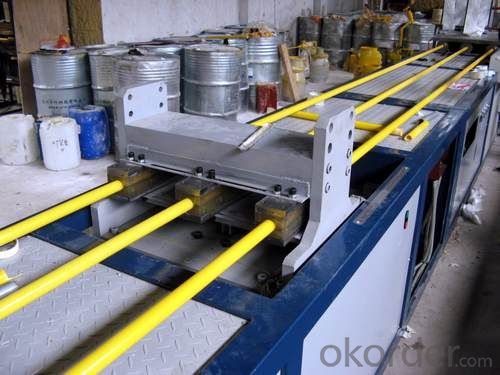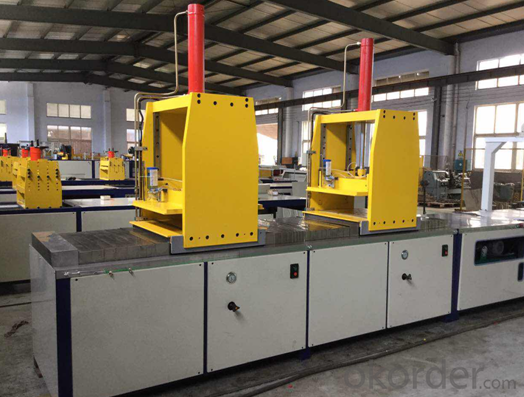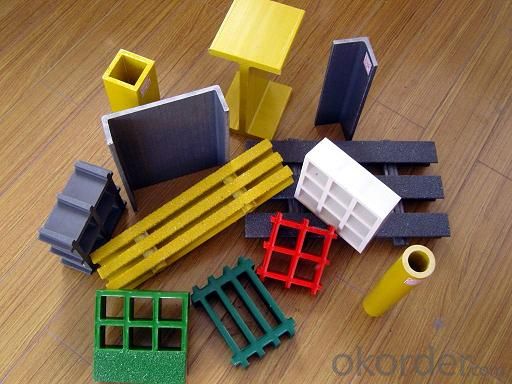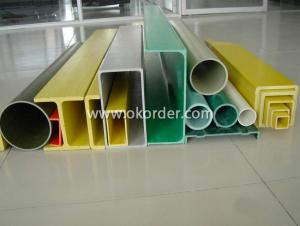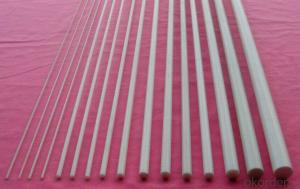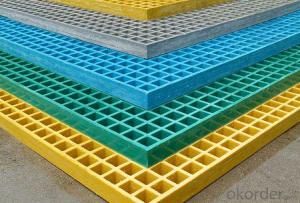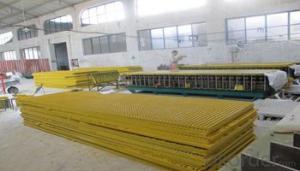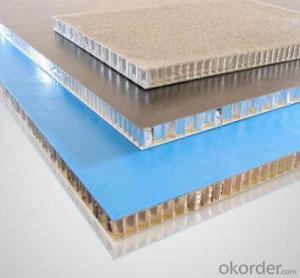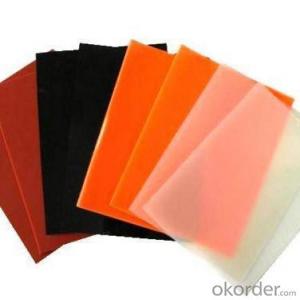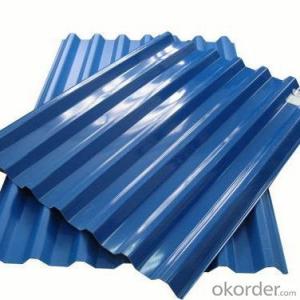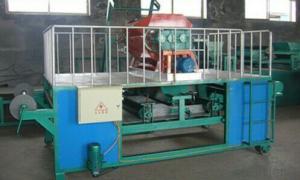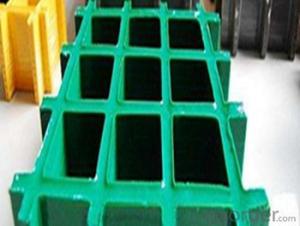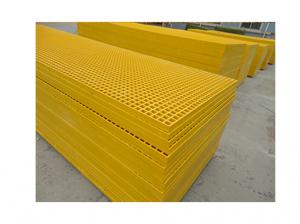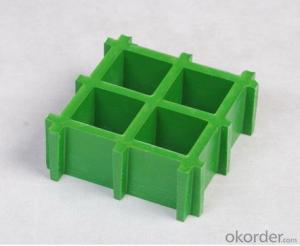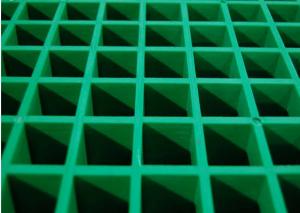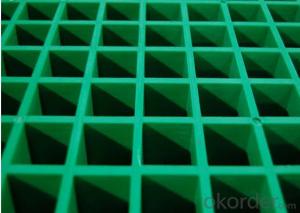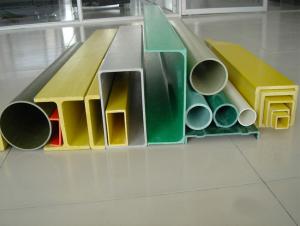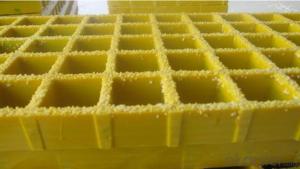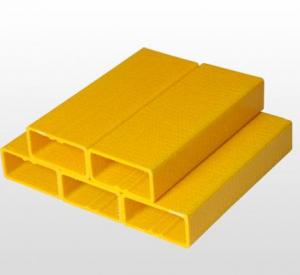FRP Pultrusion Profiles:Anti-Furring & Vermiculate Resistant FRP Pultruded Gratings
- Loading Port:
- Tianjin
- Payment Terms:
- TT OR LC
- Min Order Qty:
- 20000 m.t.
- Supply Capability:
- 100000 m.t./month
OKorder Service Pledge
OKorder Financial Service
You Might Also Like
Specification
FRP PULTRUDED GRATING AND PULTRUSION PROCESS
PRODUCT DESCRIPTION
Pultruded grating is made by a particular assembly process, which using “I” shape as its main load-bearing and special rod to go through the bearing bar. Pultruded grating include the standard grating and the custom grating, the custom grating can be designed to meet customer’s requirement or special using condition by changing the shape, size and space of the bearing bars, the surface can be covered with lozenge panel, grit panel, or added the anti-slippery sand directly.
FRP pultruded grating has the most characteristics of molded grating, but it has its distinct advantages, it has very high fiberglass content in the loading direction, so it has very high load capability, it has more superiority when used at wide span, so that the basic support will be decreased and the project cost will be reduced accordingly.
SPECIFICATION
The standard space between two crossbars is 6 inch or 12 inch.
Thickness (mm) | Bar width (mm) | Open space (mm) | Open rate (%) | Approx weight (kg/m |
25.4 | 15.2 | 22.8 | 60 | 13.2 |
25.4 | 15.2 | 15.2 | 50 | 15.9 |
25.4 | 15.2 | 10.1 | 40 | 18.5 |
25.4 | 40 | 10.8 | 21 | 14.5 |
38.1 | 15.2 | 22.8 | 60 | 15.8 |
38.1 | 15.2 | 15.2 | 50 | 19.1 |
38.1 | 15.2 | 10.1 | 40 | 22.4 |
50.8 | 25.4 | 25.4 | 50 | 16.6 |
50.8 | 25.4 | 12.7 | 33 | 21.1 |
CHOICE FOR PULTRUDED GRATING
Resin: GP resin, ISO resin, VE resin, Phenol resin
Color choice: Yellow, gray, green, custom color
Surface choice: Groove surface, grit surface, lozenge cover surface
FEATURES
a. Anti-corrosion and anti-rust
b. Light weight and high strength
c. Anti-flammable
d. Anti- fatigue
e. Safe and anti-slippery
f. Anti-ageing
g. Easy of maintenance
h. Excellent electromagnetism property
i. Good economic benefit
FIELDS SERVED
Sewage treatment,
water supply and drainage,
chemical industry,
oil industry,
power engineering,
pulp and paper,
construction engineering,
spinning, marine engineering.
APPLICATION
Operation terrace,
stair walkway,
ground floor,
trench cover,
sidewalk,
foot bridge,
equipment safety fence,
scaffold.
COMPANT DESCRIPTION
CNBM,China National Building Materials Group is a state-owned enterprise in charge of administrative affairs in china building materials industry. Established in 1984, CNBM is a large group corporation of building materials with total assets of 25 billion RMB and a total staff of 30,000.CNBM now owns 200 subordinating firms of solely owned and joint-venture companies.
CNBM International Corporation is one subsidiary of CNBM, we focus on offering good-quality products,professional service and complete solution to our customers. Strong delivery capacity, advanced technology& management, strong financing capability and excellent after-sale service are our advantages in sharing international market.
FAQ
1.Q:Are you factory or trading company ?
A:We are Factory produce FRP machines and FRP products.
2.Q:If can customized by customers requirements?
A:yes,we can produce the machine with customized size.
3.Q:How about the payment?
A:We accept any kind of payment.
4.Q:What is the guarantee?
A:Gurantee is one year.
5.Q:If you can training?
A:yes ,we can training in our factory also can send engineers to your factory training.
PICTURES
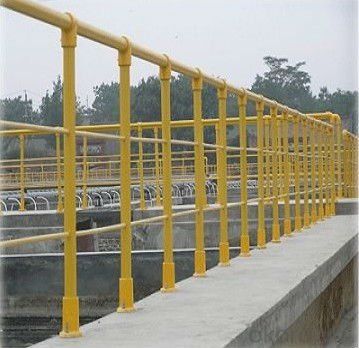
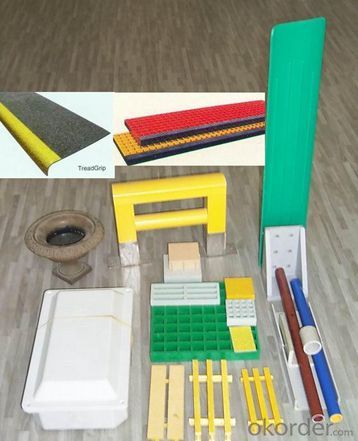
- Q: Are FRP pultrusion profiles resistant to moisture or humidity?
- Yes, FRP (Fiber Reinforced Polymer) pultrusion profiles are highly resistant to moisture and humidity. The pultrusion process involves impregnating continuous fibers with a polymer resin, resulting in a strong and durable composite material. This composite is inherently moisture-resistant and does not absorb water like traditional materials such as wood or metal. Additionally, FRP pultrusion profiles have a low coefficient of thermal expansion, meaning they are less likely to expand or contract under varying levels of humidity. This resistance to moisture and humidity makes FRP pultrusion profiles suitable for a wide range of applications, including outdoor structures, marine environments, and other moisture-prone areas.
- Q: Can FRP pultrusion profiles be used for structural applications?
- Yes, FRP pultrusion profiles can be used for structural applications. They are commonly utilized in various industries such as construction, automotive, aerospace, and marine. FRP pultrusion profiles offer high strength-to-weight ratio, excellent corrosion resistance, and durability, making them suitable for structural components like beams, columns, and trusses. Additionally, they can be designed to meet specific load requirements and offer design flexibility.
- Q: Can FRP pultrusion profiles be used in the water and wastewater treatment industry?
- FRP pultrusion profiles have the capability to be utilized in the water and wastewater treatment sector. These profiles possess exceptional mechanical properties, durability, and corrosion resistance, making them suitable for a wide range of applications in this industry. The resistance to corrosion is one of the primary benefits of FRP pultrusion profiles. Water and wastewater treatment facilities often face corrosive environments, high humidity, and aggressive chemicals. Unlike traditional materials such as wood or steel, FRP pultrusion profiles are specifically engineered to endure these harsh conditions without corroding. This ensures long-term performance and reduces the need for frequent maintenance or replacement, ultimately decreasing costs. Moreover, FRP pultrusion profiles offer an excellent strength-to-weight ratio, making them perfect for structural purposes in water and wastewater treatment facilities. These profiles can be utilized as walkways, handrails, grating, ladders, and other structural components. Their lightweight nature allows for easy installation and minimizes the burden on supporting structures. Additionally, FRP pultrusion profiles are non-conductive, providing an added safety advantage in water and wastewater treatment facilities. This is especially crucial when working with electrical equipment or in areas close to water sources, as it reduces the risk of electrical hazards. Furthermore, FRP pultrusion profiles can be customized to meet specific design requirements, including different shapes, sizes, and colors. This flexibility allows for greater design freedom, ensuring that the profiles can be tailored to fit the unique needs of water and wastewater treatment projects. In summary, the utilization of FRP pultrusion profiles in the water and wastewater treatment industry offers numerous advantages, including corrosion resistance, high strength, lightweight properties, non-conductivity, and design flexibility. These qualities make FRP profiles a dependable and cost-effective choice for various applications in this industry.
- Q: Are FRP pultrusion profiles resistant to automotive fluids?
- FRP pultrusion profiles, commonly known as Fiber Reinforced Polymer profiles, possess a general resistance to automotive fluids. FRP, an abbreviation for Fiber Reinforced Polymer, is a composite material comprising a combination of fibers and a polymer matrix. The fibers utilized in FRP, such as fiberglass, carbon, or aramid, exhibit exceptional resistance to various automotive fluids, including oils, fuels, and coolants. The polymer matrix found in FRP profiles usually consists of a thermosetting resin, namely polyester, vinyl ester, or epoxy. These resins are renowned for their chemical resistance properties, which contribute to the high resistance of FRP pultrusion profiles towards a wide array of automotive fluids. They can endure exposure to different fluids without significant deterioration or loss of mechanical properties. It is important to acknowledge that the specific resistance of FRP pultrusion profiles to automotive fluids may differ based on the resin type and the composite material's precise composition. As a result, it is advisable to consult the manufacturer or supplier of the FRP profiles to verify their suitability for the intended application and the specific automotive fluids they may encounter.
- Q: What are the best manufacturers of glass fiber reinforced plastic pultruded profiles in China?
- In addition to the thickness of radome products, there should be other requirements.
- Q: How do FRP pultrusion profiles handle cyclic torsion loads?
- FRP (Fiber Reinforced Polymer) pultrusion profiles are designed to handle cyclic torsion loads effectively. The unique properties of FRP materials make them highly resistant to fatigue, making them suitable for applications where cyclic torsion loads are expected. One key advantage of FRP pultrusion profiles is their high strength-to-weight ratio. Reinforced with fibers such as glass or carbon, these profiles offer excellent tensile strength and stiffness, enabling them to withstand repeated torsional forces without deformation or failure. Moreover, FRP pultrusion profiles exhibit superior resistance to corrosion and chemical degradation compared to traditional materials like steel. This resistance ensures that the profiles maintain their structural integrity even in harsh environments where cyclic torsion loads may be prevalent. The manufacturing process of pultrusion also contributes to the ability of FRP profiles to handle cyclic torsion loads. During pultrusion, continuous fibers are impregnated with a polymer resin and then pulled through a heated die, where they are cured and shaped into the desired profile. This process ensures a uniform distribution of fibers throughout the profile, resulting in enhanced strength and stiffness in all directions, including torsion. To further enhance the performance of FRP pultrusion profiles under cyclic torsion loads, engineers employ design techniques such as optimizing the fiber orientation and selecting appropriate resin systems. These measures help distribute the torsional forces evenly across the profile, minimizing stress concentrations and improving the fatigue resistance. In summary, FRP pultrusion profiles are specifically engineered to handle cyclic torsion loads. Their high strength-to-weight ratio, resistance to corrosion, and uniform fiber distribution make them an ideal choice for applications where cyclic torsion loads are a concern.
- Q: Are FRP pultrusion profiles resistant to electrical surges or lightning strikes?
- The composition of fiberglass reinforcement and resin matrix in FRP pultrusion profiles gives them inherent electrical insulation properties. This insulation serves as a defense against electrical surges and lightning strikes to a certain extent. Nevertheless, it is crucial to acknowledge that no material can provide absolute protection against extremely high voltage electrical surges or direct lightning strikes. In these instances, additional precautions, such as grounding and lightning protection systems, must be taken to ensure the safety of structures or equipment. Therefore, while FRP pultrusion profiles do offer some resistance to electrical surges and lightning strikes, it is strongly recommended to seek guidance from experts and adhere to relevant safety standards when designing and installing electrical systems in areas susceptible to such occurrences.
- Q: Can FRP pultrusion profiles be used in the agricultural and farming industry?
- Yes, FRP pultrusion profiles can be used in the agricultural and farming industry. These profiles are lightweight, durable, and resistant to corrosion, making them suitable for various applications such as structural supports, fencing, gates, and equipment enclosures. They offer high strength-to-weight ratio, excellent weather resistance, and can withstand harsh environmental conditions commonly found in agricultural settings. Additionally, FRP profiles are non-conductive and have low thermal conductivity, which makes them ideal for electrical insulation and thermal management in farm equipment.
- Q: Are FRP pultrusion profiles resistant to oil and grease?
- FRP pultrusion profiles are widely recognized for their exceptional ability to withstand oil and grease. The combination of fibers, typically glass or carbon, with a polymer resin matrix creates a material that is naturally resistant to numerous chemicals, including oil and grease. This resistance can be attributed to the non-reactive nature of the polymer resin, which prevents oil or grease from infiltrating the material and causing harm. Moreover, the pultrusion manufacturing process further enhances the profiles' resistance to oil and grease. In this process, the fibers are soaked in the resin and then drawn through a heated die, where the resin solidifies. This results in a sturdy, uniform material with a compact surface that is less porous and more capable of resisting chemical penetration. It is important to acknowledge that the specific resistance of FRP pultrusion profiles to oil and grease can vary depending on the resin used and the conditions of the application. In certain instances, specialized resin formulations can be employed to augment the profiles' oil and grease resistance, ensuring suitability for even the most demanding environments. Overall, FRP pultrusion profiles are widely regarded as highly resistant to oil and grease, making them an exceptional choice for applications exposed to these substances. However, it is always advisable to consult with the manufacturer or supplier to confirm that the specific FRP profile being utilized is suitable for the intended application and chemical exposure.
- Q: Are FRP pultrusion profiles resistant to impact?
- FRP pultrusion profiles exhibit a general resistance to impact. The amalgamation of robust fibers and the polymer matrix employed during manufacturing renders FRP profiles exceptionally enduring, enabling them to endure substantial impacts without fracturing or shattering. Furthermore, the pultrusion process guarantees the uniform dispersion of fibers within the profile, thereby bolstering its capacity to resist impact. Consequently, FRP pultrusion profiles are ideally suited for impact-prone applications, including construction, transportation, and infrastructure ventures.
Send your message to us
FRP Pultrusion Profiles:Anti-Furring & Vermiculate Resistant FRP Pultruded Gratings
- Loading Port:
- Tianjin
- Payment Terms:
- TT OR LC
- Min Order Qty:
- 20000 m.t.
- Supply Capability:
- 100000 m.t./month
OKorder Service Pledge
OKorder Financial Service
Similar products
Hot products
Hot Searches
Related keywords
